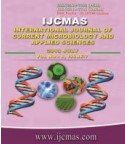


 National Academy of Agricultural Sciences (NAAS)
National Academy of Agricultural Sciences (NAAS)

|
PRINT ISSN : 2319-7692
Online ISSN : 2319-7706 Issues : 12 per year Publisher : Excellent Publishers Email : editorijcmas@gmail.com / submit@ijcmas.com Editor-in-chief: Dr.M.Prakash Index Copernicus ICV 2018: 95.39 NAAS RATING 2020: 5.38 |
Tomato is affected by a large number of diseases. Among these, collars rot disease of tomato cause by S.rolfsii is a threatening disease in eastern coastal regions of Odisha. Since, this disease is soil borne in nature, it is very difficult to control by chemical fungicides. The native rhizosphere soil of tomato was used for isolation and screening of bacterial antagonists for their efficacy and growth promotion potential. A total of 54 bacterial isolates were isolated from rhizosphere of tomato of which five isolates viz. Iso-01, Iso-17, Iso-23, Iso-24 and Iso-32 were found effective for inhibition of the mycelial growth of S. rolfsii in dual culture. Highest inhibition of radial mycelial growth of pathogen in dual culture was induced by Iso-32 (75.6%) and Iso-24 (71.1%). In greenhouse experiment to manage collar rot in artificially inoculated tomato plants in portrays, the percent disease incidence (PDI) was minimum in treatment by Iso-32 (8.8%) and Iso-24 (9.8%), respectively. Similarly, percent disease reduction over control was highest with treatment with Iso-32 (85.1%) followed by Iso-24 (83.4%). Plant length, fresh and dry weight was also enhanced significantly due to the treatment of various isolates. The higher vigour index recorded with Iso-32 (1419) followed by Iso-24 (1387.3) as compared to vigour index (680) in non-treated control. It is concluded that native rhizobacterial strains can be successfully used for managing soil borne Sclerotium sp. affecting tomato crop while enhancing the growth of the treated plants.
 |
 |
 |
 |
 |